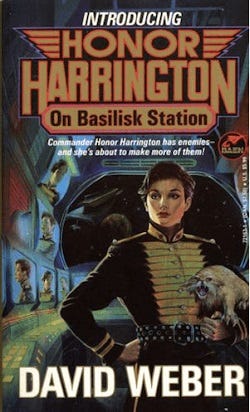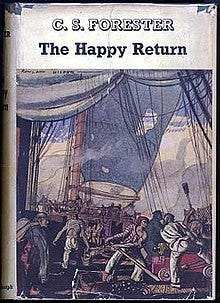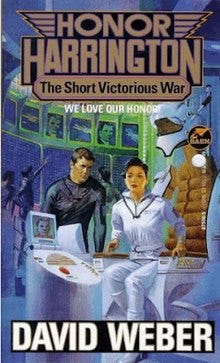How Not To Make Up A War
Weber's "Honor Harrington" series, Mary Sue's, and
I was recently reading the first three books in the Honor Harrington series, by David Weber - and that's all I'm going to read of the long series.
I did enjoy some parts, but they aren't good books. Our protagonist, Honor Harrington, has been accused of being a "Mary Sue" - unrealistically perfect and flawless. I agree, and that's what turned me off the series.

Weber has said that he modeled the series on the C. S. Forester's Horatio Hornblower series, which tells the story of a (fictional) naval officer's career in the British Royal Navy, from midshipman to admiral, during the Napoleonic Wars. However, he insists, Honor herself is her own character. I see the inspiration there, but there're also notable differences - and I think those differences go a long way toward showing the flaws in the series.
The biggest difference is that Forester was writing within the actual historical Napoleonic Wars, while Weber is inventing not just the war but the entire method of how starships fight and the entire fictional universe. Weber does it well so far - his universe feels plausible, he nicely ties his starship combat back to his invented hyperdrive physics, and I've only seen the start of the war but its start does feel plausible. However, this gives Weber much more freedom to determine who plays a significant part in each of these plausible actions.
In the real Napoleonic Wars, we know who was responsible for each of the British victories (and defeats). In fact, we know who commanded each ship in the major battles. Horatio Hornblower, being fictional, wasn't there. I could easily justify Forester editing a roster to include him somewhere (like Nordhoff did in Mutiny on the Bounty), but he doesn't. Hornblower is always somewhere else, never at a major battle.

Weber, in contrast, puts Honor squarely in a starring role in each major action so far. This doesn't strain credulity that much, given that some admirals are explicitly stated to have tapped her for major roles after her first victory. But, it plays in with the worst flaws in her character.
I don't remember Honor making any mistakes that proved significant to the plot, aside from occasionally not standing up for herself enough. What's more, she recognizes this. As Weber observes in an interview, Honor has "total confidence in her professional capabilities". He adds that she does make mistakes, but the only one he mentions is something that was immediately averted by her subordinate. She suffers absolutely no consequences for that mistake or anything else. She occasionally makes bad guesses from limited information, but she never actually fails.
This means that Honor is continuously winning every major victory for her country, constantly making the right decisions, and she appears to know it. In-universe - to her credit, I know she's not trying to parlay that into becoming a public idol or launching a coup; so far (in Book Three) she's never traded on her fame. But this's the sort of career that easily could launch someone to that, and if she ever show signs of trading on it, I expect her superiors will become concerned.
What's worse, her superiors aren't concerned at all; they're praising her. Multiple admirals have their eyes on her and are encouraging her career. In-universe, this makes sense. If I had a subordinate who against all odds won every battle she was in, I'd be encouraging her too. But out-of-universe, this just feels like the author is praising his own character. It would've been better to leave those scenes out altogether.
Out of universe, Honor feels too perfect to easily keep my sympathy. She never makes mistakes aside from her not standing up for herself, so outside of that area she never learns anything. If I were seeing her from outside, she'd feel like a larger-than-life hero rather than an actual person. Since the narration does show me enough of her head, it feels like circumstances are warping themselves around her.
Weber points out that he didn't model Honor on Horatio Hornblower, but I wish he had.
Hornblower's main character trait is his lack of self-confidence, where he constantly reproaches himself for failing to meet his own personal standards for perfection. At one point right after being rescued from captivity, he objects that he may have broken the parole he'd promised his captors. At another point, he refuses to take credit for a successful scheme he'd carried through, because he decided he'd done it with the wrong motives. This both points out Hornblower's real failings, and gains our sympathies when he points out imaginary failings.
On top of this, Hornblower has (as I mentioned) been left out of every major battle. He's done some significant things in out-of-the-way places, but he's suffered real setbacks and been left behind by events - like one time when he (on the other side of the world) learned that Britain had just allied with Spain so everything he did to destabilize the Spanish colonial empire has proven counterproductive! All this is of course quite understandable for any naval officer. In fact, it makes him feel more real. Hornblower is competent, as little as he might think so. But his career contains enough complications and imperfections that I can see how his self-doubting mind might seize on them.
We don't see any of this with Honor. Throughout these three books I've read, she maintains the "total confidence" Weber gave her.
I'm sorry about this, because aside from Honor Harrington herself, Weber does tell the story well in one very significant way.
Forester had it easy showing us the Napoleonic War, because the war already existed and he can assume that people reading historical fiction about the British Navy already know something about it. So, he keeps his viewpoint limited to Hornblower, expanding slightly from book to book as Hornblower gets promoted and earns a gradually-larger scope of responsibility.

Weber didn't have things so easy, because the tensions between the star-nations of Manticore and Haven don't exist outside of what he shows us. What he does is place Honor around significant enough figures - such as admirals and ambassadors - that we can hear enough to understand things even as the narration generally follows Honor. This's a rare skill. Essentially all the other books I remember doing it well interweave multiple plot threads, like Lord of the Rings following both Frodo and Aragorn.
Admittedly, Weber doesn't rely on this. He occasionally jumps to other perspectives for a few scenes - more often jumping to the enemy, but occasionally Honor's own high command - to show us more things she can't see. Sometimes this's fun to see, but I think they more often weaken the story. And even without them, I think his story would work well.
I've only read the first three books of this series. For all I know, things could get better later on, Honor could make mistakes that actually lead to defeats, she could learn from them, and her characterization could improve. It'd surprise me (especially given the interview I linked earlier, which Weber gave after he'd written the fifteenth book in the series), but it's not impossible.
But even in that unlikely case, the bad characterization in the first books would still be a problem for the overall story. It wouldn't properly lead up to what hypothetically would be happening later, and it would turn off readers.
I've been turned off by it myself. I don't have any plans to continue with the series. It's not all bad. As I've pointed out, I like the worldbuilding around space combat and the perspective-taking. Also, I did like the story of the coup in Haven near the end of Book Three. But, the bad characterization of Honor our protagonist means I don't find it worth continuing.
There're just so many more fun books out there.



Everything you said here is correct and, as of Book 7, none of these problems improve. Some of them worsen! Weber seems to try to address some of them but clearly just doesn't know how -- and, at this point, couldn't do it without compromising the fundamental flavor of the series. The books are bad literature.
HOWEVER!
I still enjoy reading the Honor books, and I usually treat myself to one per year.
The pleasure of an Honor Harrington book does not come from the character development (there is often drama but never development). Instead, they are puzzle boxes. Early in the book, Honor finds herself in a Situation. We explore the dimensions of that situation with her, and, as we learn about the situation (through worldbuilding, which, as you agree, Weber is pretty good at), the situation deteriorates. Eventually, it reaches a critical point where I throw up my hands and say, "Welp, she's gotta be toast. There's no way out of this one."
Honor, who is perfect, then solves the puzzle.
She plays by the rules: we, the reader, have already been told what resources are available to her. Through worldbuilding, we have been told how these resources can be put to use. During whatever passes for a plot, Honor has flawlessly developed some resources (usually her personnel) against the critical moment, and we have seen her do it. We usually even know several things Honor doesn't, thanks to scenes from the enemy perspective. Yet I see no solution. Honor does, and the fun is watching her unspool it. It's like a Hercule Poirot climax, except with sidewalls and laser-nuke warheads, plus a lot of blurry background characters dying glorious deaths.
So, the good news is, if you abandon your expectations of getting literature out of this, there is fun to be had. You might miss that fun if you are looking for the kinds of interesting human choices that make literature, but it's there. (Of course, this kind of fun might not be your cuppa.)
The bad news is, you have already all three of the best books in the series (at least as of Book 7). Weber becomes more distracted, later in the series, with showing us what I call "Honor's trophy room": here's all the stuff Honor's accomplished in past books! Here are all these people showing her respect! Go Honor! This does NOT create a Situation and functions as mere throat-clearing, which takes longer and longer to get through in each successive book.
Also, Weber thinks I remember or care about literally anyone on literally any of Honor's crews. Like, there's always a moment where some crewmember shows up and we're clearly supposed to go, "Oh! It's Ensign Blurry McGunnerstan! Good ol' Blurry! But look! He's a full-bird Lieutenant now, and he's back on Honor's crew to whip the newbies into shape! Aw, Blurry, we knew you'd make it!" I just stare blankly at these passages.
Sitting here, right now, the only non-Honor characters I can remember are her steward, McGuiness (?) who is stereotypically a steward; Admiral White Haven, because he has an outrageously long title I like to chuckle about with my sister; one of her former X.O.'s, who I call "John Harriman" in honor of the Star Trek character he resembled but I'm pretty sure that's not his name; Pawel Evilpants, the villain for several books; Honor's love interest, who certainly existed; Rob S. Pierre, because that's an even more incredible name for the bad guy than Pawel Evilpants and I made that one up; and her treecat, Sprouts. Or Boots. Or something. No wait! Nimitz! Got there in the end.
But I keep reading them, so there's something there that keeps pulling me back!
Interestingly, I have the exact opposite view on this. I would rank the Honorverse books among my favorite Sci-Fi, although a lot of that is for worldbuilding and general plot, while I tried to read Hornblower and bounced hard because I just could not put up with his constant negativity. I'm not really disputing your characterization of Honor (although it does get a bit better in later books), but what you say makes Hornblower interesting struck me as deeply irritating and unrealistic. Some of this may just be what Forester writes in terms of characters. The Ship was good, as it didn't linger too long on anyone, while The Good Shepard was tolerable given the circumstances, but I'm just not a fan of that kind of depression.
(My major pluses about Harrington are that the society and military feel very realistic in a way that isn't common in SF and that I should probably talk about more, and Weber shows his work enough that I can relax and not run around checking for perpetual motion machines the way I find myself compelled to do a lot of the time. Yes, I am defending the infodumps.)